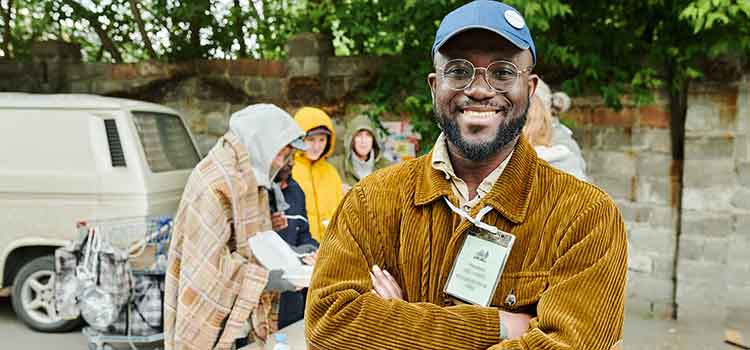In This Article
Starting your career as a social worker

Social workers are uniquely trained members of society that help people access crucial health and social services.
They are on the front lines of their communities helping disadvantaged populations improve their health and wellness—often this means addressing peoples’ fundamental needs: making sure people have adequate food, housing, health care and more.
The work they do may not always be easy, but social workers can make profound and indispensable impacts on the lives of individuals, families and communities at large.
Although some social work positions may only require less education, most social workers must have at least a Bachelor of Social Work (BSW) or a Master of Social Work (MSW) to get licensed.
What is a social worker?
In its most basic form, a social worker is someone that helps others in need. They are usually licensed professionals with social work degrees. They work in all corners of community life to help people in need get connected to appropriate resources. Social workers are also advocates for social justice and have throughout history been responsible for some of the social privileges we enjoy to this day.
Clinical social workers have an even more nuanced role. Clinical social workers diagnose and treat numerous mental health issues, making their role more focused on a client’s mental health and wellness. According to the American Board of Clinical Social Work, clinical social workers make up the largest group of mental health/healthcare providers in the United States.
“Clinical social work is focused on mental health issues. Traditional social work is based on helping people with daily needs and working for social justice,” said Laura Groshong, a clinical social worker and the Director of Policy and Practice for the Clinical Social Work Association (CSWA).
Social work specialties
Social workers may work more generally, or they can specialize by working with particular groups of people or in certain settings. Some social workers may perform multiple types of social work. The National Association of Social Workers (NASW) lists the following types of social work:
According to the U.S. Bureau of Labor Statistics (BLS), social workers held about 728,600 jobs in 2022. Child, family and school social workers made up nearly 50% of those jobs (355,300). Health care social workers made up about 25% (191,400) and mental health and substance abuse social workers made up about 15% of that share (113,500). “All other” social workers made up the remaining 10% or so (68,400).
What does a social worker do?
Social workers address social inequities in their communities and connect vulnerable populations with the resources they need the most. How they do this is going to look a little different depending on where they work and with whom.
Typical social worker job description
In general, social workers typically act as case managers by working with individuals or families to identify their needs and create an action plan to help improve their welfare.
Licensed clinical social workers can also perform psychotherapy to diagnose and treat mental, behavioral and emotional disorders.
“We provide psychotherapy and counseling to people in our offices or in agencies,” Groshong said. “Additionally, [we work] to get better access to mental health treatment through the government, through the state and national level, for parity with medical care.”
The three kinds of social work explained
These kinds of job duties apply mostly to social workers working at the micro level—working with individual cases—which is one of three kinds of social work.
Mezzo social work shares a lot of similarities with micro social work but also includes taking a step backward to identify the needs and challenges of a larger group such as a community, hospital, business or other organization.
Macro social work steps back even further to examine large-scale, systemic inequities at the community, state, federal and international levels. People doing macro social work aren’t usually working with individuals, but they are impacting people indirectly by initiating widespread change.
Clinical social workers vs. other mental health professionals
If clinical social workers can offer psychotherapy services, you may wonder what differentiates them from other mental health professionals such as therapists and psychologists. The difference, according to Groshong, ultimately comes down to how these professions are educated and where their practice focus lies.
“Psychology and mental health counseling don’t have the same interest in social justice. They do some of it, but it’s not built into their program the way it is for us, so that’s a major difference,” Groshong said. “And we’re also trained in systems, how to impact systems and improve communications when they’re not working.”
Where do social workers work?
Social workers are utilized in many different settings. They typically work in an office environment and may also spend time visiting clients or other community specialists out in the community itself. You can find social workers employed by:
“People who are in private practice like me—I generally see four to six patients a day,” Groshong said. “We’re taking notes, we’re writing reports, we’re doing all kinds of things besides actually seeing people. Then for people who work in institutions, like hospitals or schools, they have more contact with other parts of their system. They have to give the rest of the team their impression of what’s going on with clients and what they think is needed to help them with whatever problems they’re facing. Another thing that many advanced clinical social workers do is serve as expert witnesses in court. Clinicians also often teach or do webinars and meetings pretty regularly.”
8 steps to becoming a social worker in your state
Research your state’s licensing requirements.

Most states require that social workers are licensed, and all states require social workers that deliver clinical services to be licensed. Most states also have several types of social worker licenses. Start by researching your state’s social worker laws which may help you determine what type of degree you need for your individual career goals.
Complete your undergraduate education.

Most state-issued social worker licenses require that applicants have at least a Bachelor of Social Work (BSW), but it’s more common to require a Master of Social Work (MSW). Either way, you’ll most likely need a bachelor’s degree to qualify for entry-level positions in the field. Keep in mind that any BSW or MSW social work degree programs should be accredited by the Council on Social Work Education (CSWE).
Earn a graduate degree.

A graduate degree such as a Master of Social Work (MSW) may be necessary to get a social worker license in your state, and it is definitely required for anyone who wishes to go into clinical social work. Plus, MSW degrees are a prerequisite for numerous social worker credentials.
Some MSW programs require that you already have a BSW, some simply require that you have a bachelor’s degree. If you are interested in high-level leadership roles, conducting research or working in academia, then a Doctor of Social Work (DSW) or PhD in social work may be right for you.
Complete post-graduate supervised experience, if necessary.

In addition to holding an appropriate degree, many states require that social workers—much like other mental health professionals—complete several thousand hours of supervised experience after earning their graduate degree before they can get their license. This is especially true for clinical social workers.
Apply for a social worker license.

Once you’ve satisfied your state’s eligibility requirements, you can apply for a social worker license. States oftentimes have several different types of licenses depending on your level of experience or area of practice.
Take a licensing exam, if necessary.

Many state-issued social work licenses require passing one of the exams administered by the Association of Social Work Boards (ASWB). This is typically done after applying for a license. Upon passing the exam, your state may issue you your social work license.
Apply for jobs and gain experience.

Once you’ve earned your social worker license, you can start applying for social work positions. Assuming you completed some post-grad supervised experience, you should hopefully already have a taste of social work in certain work settings. This existing experience may help you hone in on the type of jobs you want, be it working in a correctional facility, in schools, working with people that have substance abuse disorders or something else entirely.
Get certified.

There are many social work credentials available from the National Association of Social Workers (NASW) and other organizations, especially for social workers who specialize in a certain area of practice.
Getting certified demonstrates a level of experience and expertise that may increase your credibility and job prospects. In general, you need to have either a BSW or MSW degree plus a few years of experience in your specialty area to qualify for a credential.
What degree do you need to be a social worker?
Licensing requirements for social workers vary by state. Most states require social workers to be licensed, and the typical minimum education requirement to get licensed is a Master of Social Work (MSW) degree. Clinical social workers must have an MSW in every state.
“There are programs that offer more coursework in clinical social work, but it is not a separate degree,” Groshong said.
If you wish to teach in academia, work in high-level leadership roles, work in public policy or focus on research, you may want to take your education beyond a master’s degree and consider a Doctor of Social Work (DSW) or a PhD in social work.
Can you be a social worker with a bachelor’s degree?
A Bachelor of Social Work (BSW) can still be a great stepping stone to an MSW or qualify you for entry-level positions. In addition, some states do have social work licenses for people who only have a BSW. The education path that’s right for you is going to depend on a combination of factors, primarily how high up the career ladder you wish to go and the licensing requirements where you live.
In order to qualify for licensure, social work educational programs must be accredited by the Council on Social Work Education (CSWE).
Are there online social work degrees?
Yes, you can find online social work programs at the associate all the way to the doctoral level. Many programs also offer hybrid learning formats, which consist of a combination of online classes and periodic on-campus experiences. Keep in mind, however, that graduate programs and many BSW programs require some kind of internship and/or practicum experience to graduate. These experiences must be done on-site either at the school or in the community.
Getting licensed as a social worker
Depending on their specialty, education level, particular job scope and location, social workers can go by lots of different names and titles. One reason for all the different names is that states determine their own social worker licenses. Although many states use the same titles and credentials, some may have their own unique designations that vary from the norm.
In general, getting licensed as a social worker requires the following:
- Complete a social work education program such as a BSW, MSW or higher degree
- For clinical or advanced social workers: Complete a certain number of hours of post-graduate supervised clinical experience (usually 3,000-4,000 hours)
- Apply for a social worker license with your state
- Pass an exam, typically one of the exams offered by the Association of Social Work Boards (ASWB)
Here are some examples of common social worker licenses and what they typically mean:
| License | Typical general requirements |
|---|---|
| Licensed Baccalaureate Social Worker (LBSW) | Graduated from a BSW program and passed the ASWB bachelor’s exam |
| Licensed Master Social Worker (LBSW) | Graduated from an MSW program and passed the ASWB master’s exam |
| Licensed Advanced Social Worker (LASW) | Graduated from a graduate-level social work program, completed post-grad supervised experience and passed the ASWB advanced generalist exam |
| Licensed Clinical Social Worker (LCSW) or Licensed Independent Clinical Social Worker (LICSW) | Graduated from a graduate-level social work program, completed post-grad supervised experience and passed the ASWB clinical exam |
Keep in mind that the licenses offered in your state may not have the exact same names or the same qualifications. Be sure to check with your state’s regulatory body that issues social work licenses to find out which license is right for you.
Social work certifications
There are many voluntary certifications available to social workers that they can earn on top of getting licensed. Getting certified demonstrates your experience and expertise to peers and potential clients, thereby increasing your credibility and job options, and could even lead to a higher salary.
The National Association of Social Workers (NASW) currently offers 20 different social work credentials for numerous social work domains such as clinical, youth and family, gerontology, military and more. Each credential requires possessing a degree (a BSW or MSW), experience in that specialty area, and passing an exam in some cases.
The American Board of Clinical Social Work (ABCSW) has four certifications which are for clinical social workers only. Their Board Certified Diplomate in Clinical Social Work (BCD) credential must be earned before applying for the three other credentials that they offer. Clinical social workers must satisfy the following to be eligible for the BCD credential:
Is this career path right for you? (Professional social worker offers perspective)
By helping people fulfill their basic needs, overcome mental health challenges or advocating for social justice, social workers often get to enjoy an incredibly gratifying career.
Relationships & fulfillment
“By far the best part of being a clinical social worker is watching patients grow. To see them improve, to have them come in a lot of distress and gradually overcome the anxiety or depression or other issues that brought them to treatment—that is very rewarding,” Groshong said. “I’d also say that the relationships I have with colleagues, that’s a really great part of this profession. Everybody sharing the same values and the same interests in helping people.”
Burnout risk
Like other mental health and healthcare providers, burnout can be common. High caseloads are a common problem and make it difficult or near impossible to help everyone in need. In addition, underfunded social services can mean that social workers have fewer resources to work with and are prone to less than adequate salaries.
Business skills & private practice
Moving into private practice, particularly for clinical social workers, might provide more flexibility and a higher salary. However, starting your own business can come with its own challenges that you must be prepared for.
“For clinical social work I think it’s very important to learn basic business practices, because running a private practice is running a business. Most of us don’t get that kind of training in master’s programs,” Groshong said. “It’s also crucial to have a network of people that you rely on. You can’t just sit in your office and have a successful practice. You need colleagues. You need an accountant. You need a financial advisor, you need a referral network. All those things are crucial to success as a clinician.”
How much do social workers make?
The BLS collects salary data for four types of social workers: healthcare social workers; child, family and school social workers; mental health and substance abuse social workers; and social workers, all other.
Child, family and school social workers which make up about half of all social workers in their data had a median annual wage of $53,940 according to the BLS, nearly $10,000 less than the annual mean wage across all occupations. Mental health and substance abuse social workers had a median annual wage of $55,960. Healthcare social workers and social workers in the “All other” category had higher median annual wages at $62,940 and $63,770, respectively.
Although the highest paying states for social workers depends on which category of social worker you look at, states that consistently rank highly in multiple categories include California, the District of Columbia, New York, New Jersey, Hawaii and Connecticut.
What is the job outlook like?
Social workers may be able to enjoy some job security knowing that their profession has a strong outlook in the years to come. Across all categories of social workers, the BLS estimates that the employment of social workers will grow 7.4% through 2032, which is about twice as fast as the average across all occupations.
That translates to about 74,000 new jobs each year, on average, through 2032. Healthcare and mental health and substance abuse social workers are expected to grow the most at .10.6%
A nationwide behavioral healthcare shortage, which was further exacerbated by the COVID-19 pandemic, should create opportunity for people entering the field to address the demand for behavioral healthcare services. With clinical social workers constituting the largest group of mental health/healthcare providers in the United States, this becomes especially true.
Frequently asked questions
Can I become a social worker without a degree?
It may be possible to find jobs in social work settings without a degree, but you cannot get licensed as a social worker without a degree. Only a handful of states offer social work licenses that require only an associate degree, and the rest require at least a bachelor’s or master’s.
Can a social worker be a therapist?
Licensed clinical social workers can offer psychotherapy to individuals, groups and families.
Can I start a career in social work even if I’m older?
You can start a social work career at any age, so long as you obtain the appropriate education and abide by your state’s licensing laws.
What is the fastest way to become a social worker?
The fastest way to become a social worker depends on your state’s licensing laws. A few states offer social work associate licenses for people who have completed an associate degree, which can be completed in about two years. In most places, you need at least a bachelor’s degree which usually takes four years to complete or a master’s degree which is another two years on top of a bachelor’s education.
Getting started
The need for qualified social workers and behavioral health providers continues to grow. If you think you have what it takes to join the largest legion of mental health providers in the U.S., the field of social work may be a career to last you a lifetime.
Getting a bachelor’s degree in social work is a good place to start, and you may need a master’s degree in social work as well. If you already have a bachelor’s degree in another area, that’s okay—many MSW programs do not require that your bachelor’s degree be in social work. Your education could be the first step in making a profound difference in others’ lives.
Published: April 19, 2023

Written and reported by:
Kendall Upton
Staff Writer

With professional insights from:
Laura Groshong, LICSW, Director of Policy and Practice
Clinical Social Work Association
